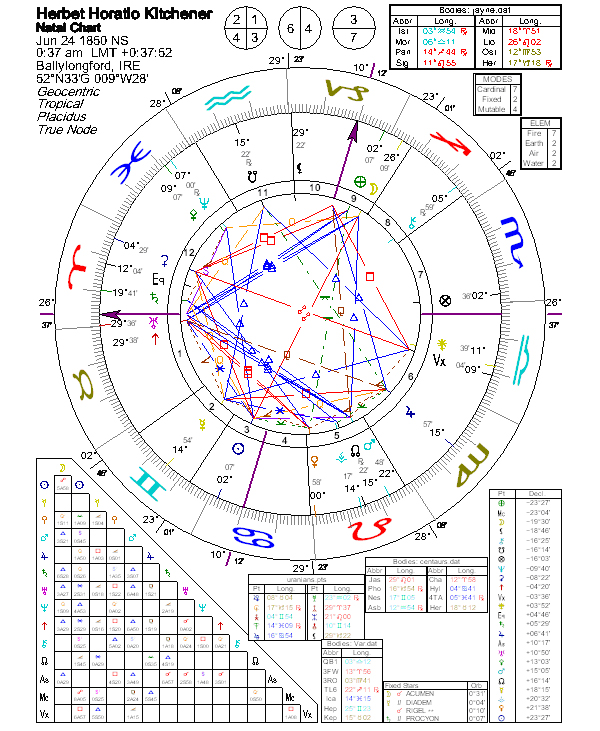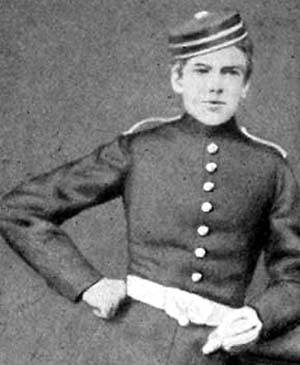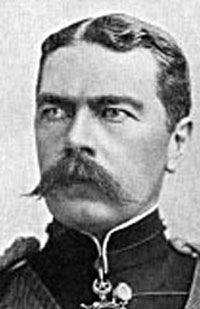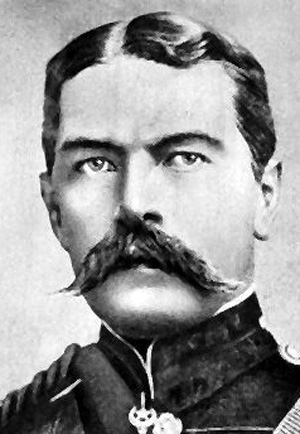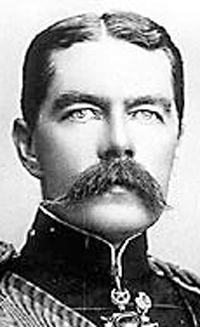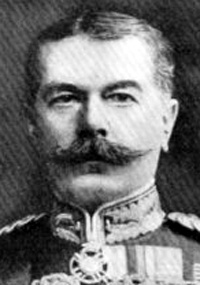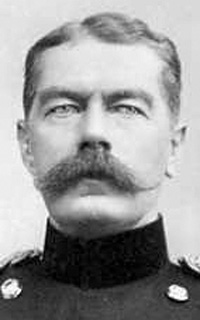Horatio Herbert Kitchener
Copyright Michael D. Robbins 2005
Astro-Rayological
Interpretation & Charts
Quotes
Biography
Images and Physiognomic Interpretation
Herbert Horatio Kitchener—Lord George Kitchener—English General:
June 24, 1850, Ballylongford, Ireland. Times given variously as 12:37 AM, LMT
(Marc Penfield taken from Sabian Symbols) and 10:50 PM, LMT (Lois Rodden, as reported by Lyndoe “from a witness present at his birth”) Died, in an explosion aboard ship, June 5, 1916.
Ascendant either Aries {Penfield} or Aquarius {Rodden}; Sun in Cancer; Moon either Sagittarius {Penfield} or Capricorn {Rodden}; Mercury in Gemini; Venus in Leo; Mars in Leo; Jupiter in Virgo; Saturn, Pluto and Uranus in Aries with Uranus conjuncting Pluto and both rising in the Aries Ascending chart; Neptune in Pisces.
The Tibetan Teacher speaks of Kitchener as upon the first ray but with the seventh ray as an important additional ray giving him his formidable powers of organization.
“We have seen that the born leader belongs to this ray, wholly or in part. It makes the able commander-in-chief, such as Napoleon or Kitchener. Napoleon was first and fourth rays, and Kitchener was first and seventh, the seventh ray giving him his remarkable power of organisation.” (EP I 202)
Either chart will support the first and seventh rays. The Aquarius rising chart has a Capricorn Moon emphasizing the seventh ray, as does Cancer, Kitchener’s Sun Sign..
The Aries rising chart, however, is much stronger, for Aries would bring in the seventh ray more powerfully than the Moon in Capricorn alone, and Aries reinforces the first ray as well. In addition, seventh ray Uranus would be rising in the chart, accompanying first ray Pluto, all in first ray Aries. The Sun would be in H3 in the Aries rising chart, giving immediate organizational attention to the environment, and Jupiter in Virgo would apply to sixth house matters of immediate material needs and requirements.
The Aries rising chart also is ruled by Mars in Leo—so frequently indication of power as a leader.
Don't talk to me about atrocities in war; all war is an atrocity”
I don't mind your being killed, but I object to your being taken prisoner.
- to the Prince of Wales during World War IYou are ordered abroad as a soldier of the King to help our French comrades against the invasion of a common enemy. You have to perform a task which will need your courage, your energy, and your patience. Remember that the honor of the British Army depends on your individual conduct. It will be your duty not only to set an example of discipline and perfect steadiness under fire, but also to maintain the most friendly relations with those whom you are helping in this struggle. . . . Do your duty bravely. Fear God and honor the King.
- a printed address to British Expeditionary Force carried by soldiers during World War I
(Ascendant, Saturn, Uranus & Pluto in Aries.)It is necessary to make war not as one would, but as one must.
The Right Honourable Horatio Herbert Kitchener, 1st Earl Kitchener, KG, KP, GCB, OM, GCSI, GCMG, GCIE, ADC, PC (24 June 1850–5 June 1916) was a British Field Marshal, diplomat and statesman.
Kitchener was born in Ballylongford, County Kerry in Ireland, son of Henry Horatio Kitchener and Frances Anne Chevallier-Cole. Educated in Switzerland and at the Royal Military Academy, he offered to fight with the French in the Franco-Prussian War before he joined the Royal Engineers in 1871. He served in Palestine, Egypt, and Cyprus as a surveyor, learned Arabic, and prepared detailed topographical maps of the areas.
He later served as a Vice-Consul in Anatolia, and in 1884 as an Aide de Camp during the failed Gordon relief expedition in the Sudan. At this time his fiancée, and possibly the only love of his life, Hermione Baker, died of typhoid fever in Cairo; he subsequently had no issue. But he raised his young great-niece Bertha Chevallier-Boutell, daughter of Kitchener's first-cousin, Sir Francis Hepburn de Chevallier-Boutell.
He won national fame on his second tour in the Sudan (1886–1899), being made Aide de Camp to Queen Victoria and collecting a Knighthood of the Bath. After becoming Sirdar of the Egyptian Army he headed the victorious Anglo-Egyptian army at the Battle of Omdurman on September 2, 1898, a victory made possible by the massive rail construction program he had instituted in the area.
Kitchener quite possibly prevented war between France and Britain when he dealt firmly but non-violently with the French military expedition to claim Fashoda, in what became known as the Fashoda Incident.
He was created Baron Kitchener, of Khartoum and of Aspall in the County of Suffolk, on 18 November 1898 as a victory title commemorating his successes, and began a programme restoring good governance to the Sudan. The programme had a strong foundation based on education, Gordon Memorial College being its centrepiece, and not simply for the children of the local elites - children from anywhere could apply to study.
He ordered the mosques of Khartoum rebuilt and instituted reforms which recognised Friday - the Muslim holy day - as the official day of rest, and guaranteed freedom of religion to all citizens of the Sudan. He went so far as to prevent evangelical Christian missionaries from attempting to convert Muslims to Christianity.
Kitchener rescued a substantial charitable fund which had been diverted into the pockets of the Khedive of Egypt, and put it to use improving the lives of the ordinary Sudanese.
He also reformed the debt laws, preventing rapacious moneylenders from stripping away all assets of impoverished farmers, guaranteeing them five acres (20 000 m²) of land to farm for themselves and the tools to farm with. In 1899 Kitchener was presented with a small island in the Nile at Aswan as in gratitude for his services; the island was renamed Kitchener's Island in his honour.
During the Second Boer War (1899–1902), Kitchener arrived with Lord Roberts and the massive British reinforcements of December 1899. Kitchener was made overall commander in November 1900 following Roberts' removal due to illness.
Following the defeat of the conventional Boer forces, and the failure of a reconciliatory peace treaty in February 1901 (due to British cabinet veto) that Kitchener had negotiated with the Boer leaders, Kitchener inherited and expanded the successful strategies devised by Roberts to crush the Boer guerrillas.
In a brutal campaign, these strategies removed civilian support from the Boers by destroying Boer farms, building blockhouses, and moving civilians into the first concentration camps. Conditions in these camps, which had been conceived by Roberts as a form of humanitarian aid to the families whose farms he had destroyed, began to rapidly degenerate as the large influx of Boers outstripped the minuscule ability of the British to cope. Despite being largely rectified by late 1901, they led to wide opprobrium both at home and abroad.
One of the Boer commandos' most provocative tactics was to steal the uniforms of captured troops and masquerade as British soldiers in order to gain a tactical advantage in battle; in response Kitchener ordered that Boers found wearing British uniforms were to be tried on the spot and the sentence, death, confirmed by the commanding officer. This order - which Kitchener later denied issuing - led to the famous Breaker Morant case, in which several Australian soldiers, including the celebrated horseman and bush poet Lt. Harry "Breaker" Morant, were arrested and court-martialled for summarily executing Boer prisoners and civilians including children and Africans, and also the murder of a German missionary.
Morant and another Australian, Lt. Peter Handcock, were found guilty, sentenced to death and shot by firing squad at Pietersburg on 27 February 1902. Their death warrants were personally signed by Kitchener. The trial and execution remain controversial, especially in Australia, where it is widely believed that the court-martial was flawed, that Kitchener disappeared on tour immediately following the trial in order to prevent a last-minute appeal, and that Morant and Handcock were scapegoats who unfairly took the blame for the killings in order to cover up the extent of Kitchener's no prisoners policy. This situation has been exacerbated by the loss of the court-martial documents relating to the case, leaving only a book written by one of the men found guilty, George Witton, as primary evidence of the proceedings.
The Treaty of Vereeniging was signed in 1902 following a tense six months. During this period Kitchener struggled against the Governor of the Cape Colony and the British government; eventually he won a peace of reconciliation that recognised certain rights of the Boers and promised future self-government. (Louis Botha, the Boer leader Kitchener negotiated his aborted peace treaty with in 1901, became the first Prime Minister of the self-governing Union of South Africa in 1910.) The Treaty also agreed to pay for reconstruction following the end of hostilities. Six days later Kitchener was created Viscount Kitchener, of Khartoum and of the Vaal in the Colony of Transvaal and of Aspall in the County of Suffolk.
Following this, Kitchener was made Commander-in-Chief in India (1902–1909), where he reconstructed the greatly disorganised Indian army, against the wishes of the bellicose viceroy Lord Curzon, who became a passionate and lifelong enemy. Kitchener was promoted to the highest Army rank, Field Marshal, in 1910; however, largely due to a Curzon-inspired whispering campaign, he was turned down for the post of Viceroy of India in 1911. He then returned to Egypt as British Governor General of Egypt and the Sudan (1911–1914, during the formal reign of 'Abbas Hilmi II as Khedive (nominally Ottoman Viceroy) of Egypt, Sovereign of Nubia, of the Sudan, of Kordofan and of Darfur).
He was created Earl Kitchener, of Khartoum (of which he was already Baron) and of Broome in the County of Kent, on 29 June 1914. Unusually, provision was made for the title to be passed on to his brother and nephew, since Kitchener was not married and had no children.
A World War I recruitment poster featuring Kitchener.At the outset of World War I, Prime Minister Herbert Henry Asquith quickly had Lord Kitchener appointed Secretary of State for War. Against cabinet opinion, Kitchener correctly predicted a long war that would last at least three years, require huge new armies to defeat Germany, and suffer huge casualties before the end would come.
A massive recruitment campaign began, which soon featured a distinctive poster of himself, taken from a magazine front cover. It has proved to be one of the most enduring iimages of World War I and could have encouraged large numbers of volunteers, although it has often been parodied since.
In an effort to find a way to relieve pressure on the Western front, he proposed an invasion of Iskenderun with ANZAC, New Army and Indian troops. Alexandretta was an area with a large Christian population and was the strategic centre of the Ottoman Empire's railway network - its capture would have cut the empire in two. Yet he was eventually persuaded to support Winston Churchill's disastrous Gallipoli campaign in 1915–1916. That failure, combined with the Shell Crisis of 1915, was to deal Kitchener's political reputation a heavy blow; he offered to resign but Asquith refused, although responsibility for munitions was moved to a new ministry headed by David Lloyd George. In May 1916 preparations were made for Kitchener and Lloyd George to visit Russia on a diplomatic mission. Lloyd George was otherwise engaged with his new Ministry and so it was decided to send Kitchener alone.
A week before his death Kitchener confided to Lord Derby that he intended to press relentlessly for a peace of reconciliation, regardless of his position, when the war was over, as he feared that the politicians would make a bad peace.
On 4 June 1916, he personally answered questions asked by politicians about his running of the war effort; at the start of hostilities Kitchener ordered 2 million rifles with various US arms manufacturers. Only 480 of these rifles had arrived in the UK by 4th June 1916. The numbers of shells supplied were no less paltry. Kitchener explained the efforts he had made in order to secure alternative supplies. He received a resounding vote of thanks from the 200+ MPs who had arrived to question him, both for his candour and for his efforts to keep the troops armed; Sir George Arthur, who, a week before, had introduced the failed vote of censure in the House of Commons against Kitchener's running of the War Department, personally seconded the motion.
At Scapa Flow, Lord Kitchener embarked aboard the armoured cruiser HMS Hampshire for his diplomatic mission to Russia. On 5 June 1916, while en route to the Russian port of Arkhangelsk, Hampshire struck a mine during a Force 9 gale and sank west of the Orkney Islands. Kitchener, his staff, and 643 of the crew of 655 were drowned or died of exposure. His body was never found. The same day, the last Division of Kitchener's New Army crossed the channel to take up its positions in Flanders and France where, eventually, and despite numerous setbacks, they helped to defeat Germany in 1918.
Following his death the town of Berlin, Ontario, Canada, was renamed Kitchener in his honour. Mount Kitchener in the Canadian Rockies was also named in his honour. A memorial was erected in his honour on the nearby cliffs.
A month after his death the Lord Kitchener National Memorial Fund was set up by the Lord Mayor of London to honour his memory. It was used to aid casualties of the war, both practically and financially; following the war's end, the fund was used to enable university educations for soldiers, ex-soldiers and their sons, a function it continues to perform today.
